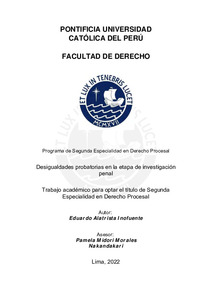| dc.contributor.advisor | Morales Nakandakari, Pamela Midori | |
| dc.contributor.author | Alatrista Inofuente, Eduardo | |
| dc.date.accessioned | 2023-03-27T21:32:28Z | |
| dc.date.available | 2023-03-27T21:32:28Z | |
| dc.date.created | 2022 | |
| dc.date.issued | 2023-03-27 | |
| dc.identifier.uri | http://hdl.handle.net/20.500.12404/24547 | |
| dc.description.abstract | Este articulo tiene como objetivo, analizar las posibilidades de solicitar la
actuación de prueba que tiene el imputado en una investigación penal, donde la
norma procesal procura garantizar la participación en igualdades. A la vez otorga
privilegios innecesarios a la fiscalía, para que sea quien en la investigación penal
discrecionalmente determine sobre que actuaciones se efectuarán, encontrando
ahí limites la actuación de prueba para el imputado. Esto se torna más complejo,
cuando el juez de la investigación preparatoria quien debería equilibrar las
desigualdades no ha comprendido su labor imparcial y obligación de actuar con
razonabilidad, para que no exista ninguna limitación de generar prueba. Una vez
denegada la realización de una diligencia solicitada, no hay mecanismos
eficientes que garanticen al abogado defensor la posibilidad de generar prueba
a favor de los intereses del imputado e incluso por la forma diferente de
denominar a la prueba en las etapas del proceso penal, hace que se conciba a
la denegatoria de actuación de diligencias de investigación como una
circunstancia intrascendente sin vinculación con el derecho a probar | es_ES |
| dc.description.abstract | The objective of this article is to analyze the possibilities of requesting the
performance of evidence that the accused has in a criminal investigation, where
the procedural norm seeks to guarantee participation in equalities. At the same
time, it grants unnecessary privileges to the prosecution, so that it is who in the
criminal investigation discretionally determines what actions will be carried out,
finding there limits to the performance of evidence for the accused. This becomes
more complex when the preparatory investigation judge who should balance the
inequalities has not understood his impartial work and obligation to act
reasonably, so that there is no limitation to generate evidence. Once the
completion of a requested procedure is denied, there are no efficient mechanisms
that guarantee the defense attorney the possibility of generating evidence in favor
of the defendant's interests and even due to the different way of naming the
evidence in the stages of the criminal process, makes that the refusal to carry out
investigative proceedings be conceived as an inconsequential circumstance
unrelated to the right to prove. | es_ES |
| dc.language.iso | spa | es_ES |
| dc.publisher | Pontificia Universidad Católica del Perú | es_ES |
| dc.rights | info:eu-repo/semantics/openAccess | es_ES |
| dc.rights.uri | http://creativecommons.org/licenses/by/2.5/pe/ | * |
| dc.subject | Igualdad ante la ley--Perú | es_ES |
| dc.subject | Derecho procesal penal--Perú | es_ES |
| dc.subject | Prueba penal--Legislación--Perú | es_ES |
| dc.title | Desigualdades probatorias en la etapa de investigación penal | es_ES |
| dc.type | info:eu-repo/semantics/bachelorThesis | es_ES |
| thesis.degree.name | Segunda Especialidad Derecho Procesal Laboral | es_ES |
| thesis.degree.level | Título Profesional | es_ES |
| thesis.degree.grantor | Pontificia Universidad Católica del Perú. Facultad de Derecho | es_ES |
| thesis.degree.discipline | Derecho Procesal | es_ES |
| renati.advisor.dni | 46616246 | |
| renati.advisor.orcid | https://orcid.org/0009-0002-0773-6697 | es_ES |
| renati.author.dni | 45343627 | |
| renati.discipline | 421129 | es_ES |
| renati.level | https://purl.org/pe-repo/renati/level#tituloSegundaEspecialidad | es_ES |
| renati.type | https://purl.org/pe-repo/renati/type#trabajoAcademico | es_ES |
| dc.publisher.country | PE | es_ES |
| dc.subject.ocde | https://purl.org/pe-repo/ocde/ford#5.05.01 | es_ES |







